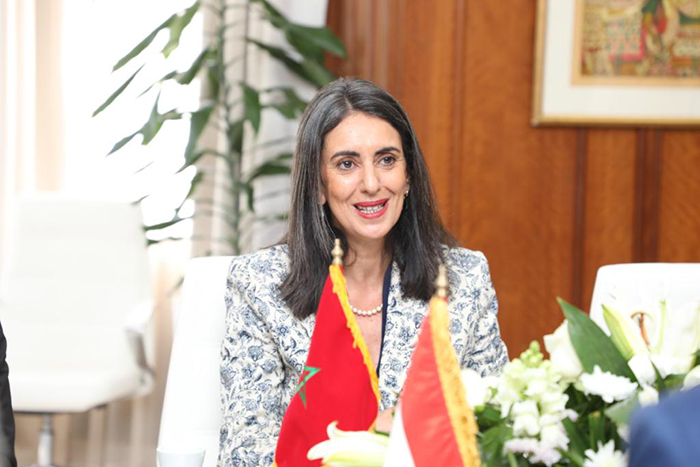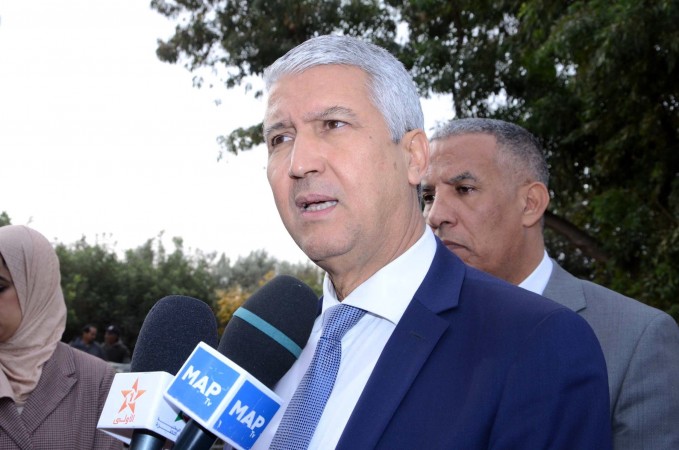Minister of Economy and Finance, Nadia Fettah, highlighted, during the joint annual meetings of Arab financial institutions, held in Cairo on Thursday, Morocco's experience in integrating fiscal and monetary policies to manage shocks and build resilience.
Speaking at a panel on "Financial sector policies for managing shocks and building resilience under uncertainty", attended by officials from Arab and international financial institutions, Fettah pointed out that Morocco, like most other countries, had not been spared by the global rise in inflation levels.
Since the start of 2022, the Kingdom has been affected by an unprecedented rise in international energy and food prices following the global economic recovery from the COVID-19 pandemic, geopolitical tensions and disruptions to global supply chains, she noted.
These external pressures were gradually reflected in production costs and local products, and turned into internal pressures, exacerbated by internal supply shocks that affected certain foodstuffs due to the successive years of drought and water stress experienced by Morocco, added the Minister.
In this context, noted Fettah, Bank Al-Maghrib (Morocco's central bank) changed the orientation of its monetary policy for the first time in 14 years, starting in September 2022, by raising the key interest rate three times in a row by a total of 150 basis points to 3%, stressing that this restrictive approach to monetary policy, in line with the global trend among central banks, prevented inflation forecasts from worsening in order to facilitate their return to desired levels.
Referring to the government's fiscal policy, the Minister noted that in order to contain the negative effects of economic shocks, including inflationary pressures, emergency and targeted budgetary measures had been adopted to mitigate the effects of rising prices on families' purchasing power.
The government intervened at the very first signs of inflation with a series of urgent measures, notably through continuing to subsidize certain basic products by the Compensation Fund and granting exceptional support to professionals in the road transport sector, she recalled.
Similarly, she added, customs duties on wheat and legume imports have been suspended, and value-added tax has been waived for products and equipment imported for exclusively agricultural use, while exceptional transfers have been allocated to support certain public institutions whose financial situation was affected by the surge in commodity prices on international markets, in exchange for maintaining the price stability of their services.
The Kingdom, aware of the need to take the necessary measures to strengthen the resilience of agricultural production in the face of rainfall scarcity and climate change, and thus improve the supply of agricultural produce, has launched a series of measures aimed in particular at adapting the Generation Green strategy to these challenges, maintaining the balance of production chains to ensure an abundance of produce at reasonable prices, and implementing seawater desalination projects for agricultural purposes while preserving water resources, she underlined.
According to Fettah, the monetary policy adopted by Bank Al-Maghrib, in parallel with the government's proactive and exceptional measures to cope with the effects of the drought and support agricultural products, has helped to halt inflation, enabling this institution to slow down the cycle of monetary tightening from June 2023 by keeping the main interest rate stable at 3%.
The Minister also stated that, besides the economic measures aiming to limit the effects of successive shocks, the government is striving to accelerate the pace of structural reforms by adopting a policy that strikes a balance between the sustainable financing needs of reform projects and the reconstitution of budgetary margins, in a context marked by the need to accelerate growth, create employment opportunities and strengthen the resilience of the national economy in the face of crises.
She went on to note that fiscal policy was based on a number of levers, in particular those concerning the strengthening of the public finance framework, the pursuit of reforms to the tax system and the support system by progressively reducing compensation expenditure, in parallel with the introduction of a direct support system based on optimal targeting of vulnerable and needy groups.






